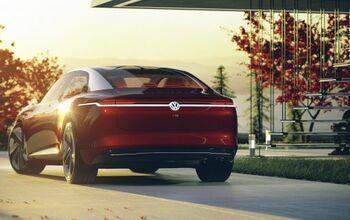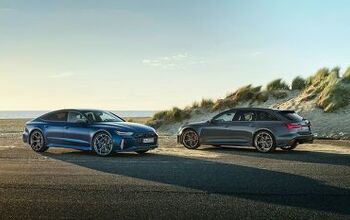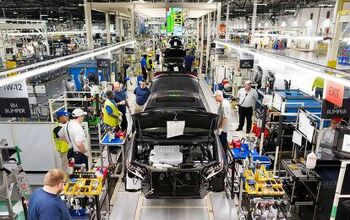Volkswagen Doubles Down on Its Lofty EV Promises

If the industry’s Magic 8 Ball worked with 100 percent accuracy, no vehicle would ever land with a disappointing thud. Sales projections would always be on target, and smooth sailing would be assured.
Alas, predicting consumer appetite and market forces is never that easy, but Volkswagen feels confident it can beat its already ambitious electric vehicle targets, both in terms of models offered and vehicles bought. It’s so confident, in fact, that it’s officially raising its own bar.
Gone is the old promise of 50 electric Volkswagen Group models by 2030. In its place, 70 models. The target of 15 million EVs sold by that target year is similarly dead, replaced by a loftier target of 22 million vehicles.
When VW’s done decarbonizing the world, you’ll thank them for their years of treachery and smog-spewing diesels. That’s the hope, anyway.
“Volkswagen is taking on responsibility with regard to the key trends of the future – particularly in connection with climate protection. The targets of the Paris Agreement are our yardstick,” said VW Group CEO Herbert Diess in a statement. “We will be systematically aligning production and other stages in the value chain to CO2 neutrality in the coming years. That is how we will be making our contribution towards limiting global warming. Volkswagen is seeking to provide individual mobility for millions of people for years to come – individual mobility that is safer, cleaner and fully connected. In order to shoulder the investments needed for the electric offensive we must make further improvements in efficiency and performance in all areas.”
Part of this roadmap includes a 30-percent in VW fleet greenhouse gas emissions by 2025 — an effort expected to cost $34 billion (USD) by 2023. By 2030, following the first and second “waves” of EV product, Diess claims 40 percent of the automaker’s vehicles will be free of emissions.
Some 13 factories (eight in Europe, four in China, one in the U.S.) will build these green machines, spread out over all VW Group brands. Buyers are, of course, encouraged to help VW out with this goal.
It’s far too early to predict whether VW’s ambitions will collide with reality or succeed, as government regulation will undoubtedly play a role in EV adoption, regardless of market. Europe’s made its choice, as has China, but big-volume markets like the U.S. remain a question mark. Americans haven’t proven as ready to make the switch.
While Volkswagen would very much like other automakers to make use of its MEB electric vehicle platform, so far there’s no takers. Ford, now in a fledgling alliance with VW, might end up using it.
“The cost of e-mobility can be significantly lowered through partnerships to enable the widest possible spread of the MEB and the associated economies of scale,” the automaker stated. “That makes individual mobility affordable and usable for the mainstream in the future as well.”
As for buyers in the European heartland, the company plans to ramp up its infrastructure investments in the hopes of making EV ownership more attractive. VW expects to install 400 fast-charging stations along major European roads and highways by 2020, some 100 of them in Germany. A company subsidiary, Elli, will sell household charge points for the slew of VW Group EVs expected to start hitting the market next year.
VW also wants its employees to go green. To get them to and from their efficient German workplaces, the company plans to install 3,500 parking lot charge points.
[Image: Volkswagen Group]

More by Steph Willems
Latest Car Reviews
Read moreLatest Product Reviews
Read moreRecent Comments
- ToolGuy TG likes price reductions.
- ToolGuy I could go for a Mustang with a Subaru powertrain. (Maybe some additional ground clearance.)
- ToolGuy Does Tim Healey care about TTAC? 😉
- ToolGuy I am slashing my food budget by 1%.
- ToolGuy TG grows skeptical about his government protecting him from bad decisions.



































Comments
Join the conversation
Whatever direction Europe takes, you can bet the People's Republic of Mexifornia will follow. Never mind that CA's share of global greenhouse emissions, if you care about such things, is mouse nuts. It's all about showing "leadership." Translation: grab the KY and bend over.
Grab the KY? What does Kentucky have to do with this? I'm guessing this is VW responding to what the world outside the US wants. Here in the US, it's giving us what we apparently want: a compact crossover that's really more a midsize, and a giant Atlas truckywagon with class-trailing fuel economy.